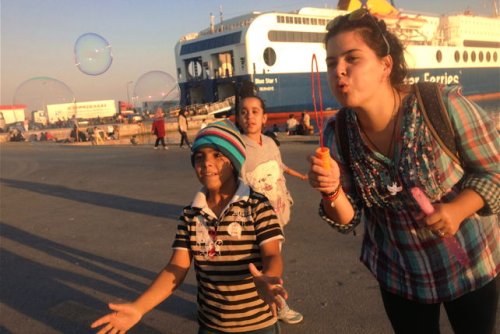
“I volunteer at a refugee camp in Lesbos, Greece. My main job is to distribute clothes, shoes and hygiene kits to the people that have made the dangerous crossing between Turkey and Greece on a small plastic boat, often with poorly made life jackets.
I get to hear a lot of stories from the people that make it to Lesbos, and it’s those stories that stay with me long after the people have left the island and continued their trip to mainland Europe, looking for a place where they are welcomed.

I got to meet a little boy from Iran whose dream was to make friends in Europe and have the chance to play football on the street. He asked me if I think people will be nice to him and if he will be able to go to school.
I also met a woman that was travelling alone with her son and who had been raped several times by the traffickers. Her son had been physically abused and drugged by these men. She talked about how she has often tried to find the courage to kill her son and herself, to end the suffering they endure for trying to flee their country torn by war.
One day I was drawing with some children and a girl handed me the artwork she had just done. One drawing showed her family inside her home as bombs were falling on top of it. Other portrayed the boat they crossed in, the people inside it crying and others drowning in the sea.

It’s hard to put into words my experience here. Some nights my job is to find a way to warm 200 people who are waiting to register at the camp, standing in a line with temperatures below freezing while it snows. Another day I had to refuse shoes to children whose feet were wet and cold, because I only had two more pairs and I wanted to save them for children with no shoes at all. At times I refuse water to adults because I only have three water-bottles left and I want to keep them for mothers that need water to make baby milk. I wonder how many times throughout my life these decisions will come back to haunt me.
Once a refugee man asked me “Do you know you are helping Muslims?” I think he expected me to stop helping him the minute I found out his religion. How can I explain to him that there is no “you” and “me” but only “us”? I think that’s what keeps me going.”

 TAIZÉ
TAIZÉ